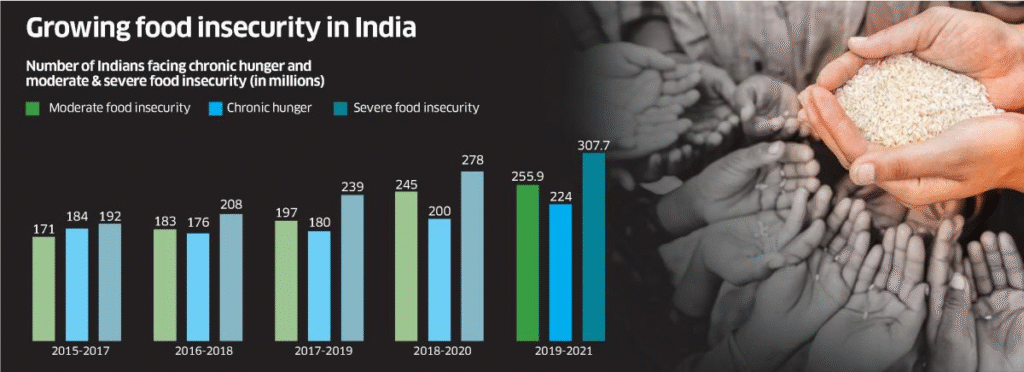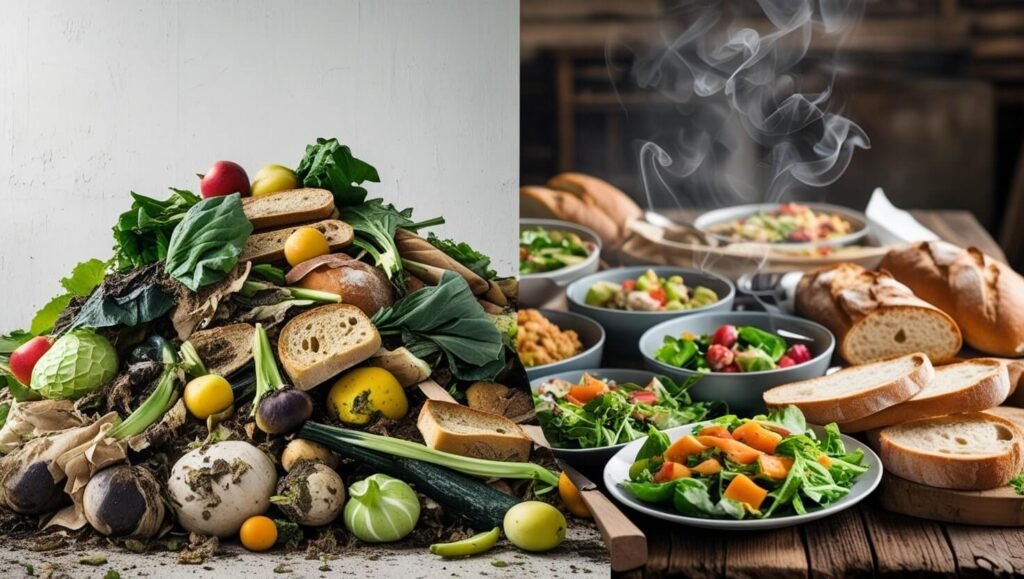Table of Contents
- 1. Directly Reducing Hunger and Malnutrition in India
- 2. Efficient Distribution and Quality Assurance Through NGOs
- 3. Reducing Food Waste and Environmental Impact
- 4. Fostering Community, Compassion, and Dignity
- 5. Types of Food Donations That Effectively Reduce Hunger in India
- 6. Food Donation in Crisis and the Future Roadmap to Reduce Hunger in India
Hunger continues to be a pressing issue across India, affecting millions of people every day. Amidst this challenge, food donation has emerged as a powerful way to reduce hunger in India by redirecting surplus food to those who need it the most.
It’s not just about feeding the hungry — it’s about restoring dignity, improving well-being, and building a more compassionate and sustainable society.
Every donated meal can make a difference, especially when it reaches the hands of someone struggling to eat even once a day.
Here’s how food donation makes a profound difference in the fight against hunger:
1. Directly Reducing Hunger and Malnutrition in India

Image credits: Deccan Herald
One of the most immediate and life-changing impacts of food donation is its ability to directly reduce hunger in India, especially among those who struggle to secure even one full meal a day.
From urban slums to rural communities, millions of Indians face food insecurity and malnutrition due to poverty, displacement, or daily economic hardship.
Food donation offers more than just a meal — it provides relief, stability, and nutrition to those who need it most.
Donated food, when thoughtfully selected and distributed, helps improve energy, immunity, and mental focus, particularly among children, pregnant women, and the elderly.
Several Indian NGOs are making a tangible difference. For example:
- NGOs like Akshaya Chaitanya’s hunger relief work in Mumbai provide structured, hot meals to underserved communities and students every day.
- Narayan Seva Sansthan provides three free meals a day to the underprivileged and also runs food distribution drives.
- Reshine Organisation, based in India, partners with corporates, restaurants, and caterers to redistribute surplus food to communities facing hunger.
- Through structured food collection and timely delivery, Reshine ensures that excess food reaches people on the same day — preserving nutrition and dignity.
These efforts show how food donation is not just an act of kindness, but a strategic way to reduce hunger in India and strengthen public health.
2. Efficient Distribution and Quality Assurance Through NGOs

For food donation to truly reduce hunger in India, it must be done with care, precision, and accountability. This is where Non-Governmental Organisations (NGOs) play a critical role.
Trusted NGOs have the systems, teams, and networks required to ensure that food reaches those who need it most — safely and efficiently.
Organisations like Akshaya Chaitanya and Child Care India Trust have established food distribution channels that cover urban and rural communities.
They maintain strict quality standards to ensure the food is fresh, hygienic, and nutritionally beneficial. This is vital when the recipients include children, the elderly, or people with compromised immunity.
Reshine Organisation follows a similar approach. By working closely with food donors — including corporate cafeterias, restaurants, and event venues — Reshine not only collects surplus food but also ensures it is safely stored, transported, and delivered within hours, minimizing food spoilage and maximizing impact.
Their trained volunteers and staff conduct quality checks and follow hygiene protocols at every stage, maintaining trust and transparency in the donation process.
Moreover, NGOs like Reshine act as a bridge — connecting food-rich zones with food-insecure areas, often in informal settlements, disaster-hit zones, or underserved rural pockets.
Their logistical efficiency and grassroots networks make food donation more than a one-time gesture — it becomes a consistent solution to reduce hunger in India.
3. Reducing Food Waste and Environmental Impact

In India, millions of tonnes of edible food are wasted every year — from weddings, restaurants, corporate events, and even household kitchens.
At the same time, crores of people go to bed hungry. Food donation provides a powerful solution that addresses both these crises at once: it reduces food waste and helps reduce hunger in India.
By donating surplus food — such as leftover meals from buffets or unsold produce from markets — we ensure that perfectly good food is not dumped into landfills.
When food decomposes in landfills, it produces methane, a harmful greenhouse gas that contributes to climate change.
So, by donating instead of discarding, we not only feed people but also protect the environment.
Reshine Organisation actively supports this eco-friendly mission by rescuing high-quality surplus food from hotels, caterers, and corporates.
Their team quickly collects and redistributes this food, often within the same day, ensuring zero food waste and maximum impact.
Their work contributes to a circular food economy — where food stays within the supply chain instead of being wasted.
In a country where both food waste and hunger exist side by side, responsible food donation offers a way to fix the imbalance — feeding people, reducing carbon footprints, and making India greener and more equitable.
Food donation is a key part of broader food redistribution in India, which ensures surplus food reaches people instead of landfills.
4. Fostering Community, Compassion, and Dignity
In India, food is deeply tied to culture, emotion, and social bonding. Donating food isn’t just about feeding someone — it’s about showing care, respect, and solidarity.
Food donation fosters compassion and community spirit, reminding us of the importance of giving back and supporting one another.
When individuals, businesses, and organisations come together to donate food, it creates a ripple effect of generosity.
It brings people from all walks of life — from chefs and volunteers to donors and delivery workers — into a shared mission: to reduce hunger in India and uplift those in need.
This shared purpose strengthens communities and inspires a culture of empathy and responsibility.
Beyond physical nourishment, food donations restore dignity to those who may otherwise feel forgotten or marginalized.
Receiving a warm, nutritious meal — served respectfully — reinforces a person’s sense of worth and belonging. It tells them, “You matter.”
Reshine Organisation ensures that every food delivery is made with care, not just efficiency.
Volunteers are trained to handle food with respect, communicate with empathy, and treat beneficiaries as equals — not as charity cases.
This humane approach turns each meal into more than sustenance — it becomes a message of hope.
At its heart, food donation is a reminder that no one in India should go hungry — and that a more compassionate and inclusive society is within reach, one meal at a time.
5. Types of Food Donations That Effectively Reduce Hunger in India
To truly reduce hunger in India, the kind of food we donate matters just as much as the act itself.
Making thoughtful food donation choices helps ensure that recipients get not just enough food — but the right kind of nutrition to support their health and well-being.
Here are the main categories of food that make the most meaningful impact:
• Staple Foods:
In India, staple items like rice, wheat flour, and lentils (dal) are dietary cornerstones, especially for low-income households. Donating these helps create familiar, filling meals.
When paired with pulses or seasonal vegetables, they form a balanced diet rich in protein and energy — critical for growing children, pregnant women, and manual laborers.
• Non-Perishable Items:
Shelf-stable goods such as cooking oil, salt, sugar, tea, coffee, dry spices, poha, suji, biscuits, and packaged grains are ideal for donation.
These can be stored for longer periods and are easy to distribute in both urban and rural areas.
They also empower beneficiaries to cook their own meals according to their taste and culture.
• Fresh Food & Cooked Meals:
Though perishable, fresh fruits, vegetables, bakery items, and cooked meals are incredibly valuable when distributed quickly and safely.
Many NGOs — including Reshine Organisation — specialize in collecting freshly prepared surplus food from hotels, events, and offices, and redistributing it the same day to avoid spoilage and ensure high nutritional value.
To maximize impact, Reshine follows strict food safety guidelines and works with trained volunteers to assess, store, and distribute perishable items with care.
This ensures beneficiaries not only receive fresh food but also maintain food safety and dignity.
By donating the right mix of staple, non-perishable, and fresh food, individuals and businesses can create a deeper, longer-lasting impact — helping to reduce hunger in India in both the short and long term.
6. Food Donation in Crisis and the Future Roadmap to Reduce Hunger in India
In times of crisis, food donation plays a life-saving role, especially in a country like India where natural disasters, floods, and pandemics frequently disrupt livelihoods.
During such emergencies, many families lose access to food overnight, and donated meals become their primary — sometimes only — source of nourishment.
Whether it’s during COVID-19 lockdowns, cyclones in coastal states, or floods in North India, humanitarian organisations, including food NGOs, have stepped up with immediate relief.
Reshine Organisation, for instance, has actively supported disaster-hit and economically stressed communities by rapidly distributing meals and ration kits through their agile volunteer network and food partners.
Looking ahead, the future of food donation in India is evolving fast — and for the better.
- Corporate partnerships are strengthening as more companies integrate food donation into their CSR initiatives.
- Technology is reshaping logistics, with real-time tracking, smart inventory systems, and mobile apps simplifying how surplus food is collected and delivered.
- Platforms like Reshine’s digital system allow businesses to quickly notify available food, while geo-tagging and live coordination ensure it reaches the nearest underserved area on time.
- Social media awareness campaigns are also helping reduce stigma around food donation and encouraging more individuals to contribute.
As India moves toward sustainable development, food donation will play an even more critical role in reducing hunger, minimizing food waste, and building climate resilience.
With growing collaboration, innovation, and compassion, a hunger-free India is no longer just a dream — it’s a goal within reach.


